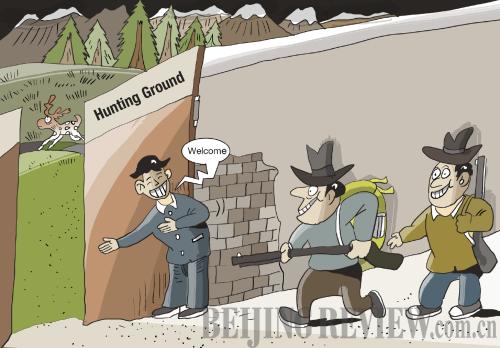 |
|
(CFP) |
Dulan was not a regulated hunting ground before the 1990s.
In 1985, a Chinese-American, Liu Guolie, discovered the abundant wildlife in Dulan and proposed the establishment of a hunting ground in the vicinity of the town. The SFA agreed to give Liu a five-year trial.
Covering 13,000 hectares, the Dulan International Hunting Ground is home to about 160,000 wild animals, including snow leopards, white-lipped deer, blue sheep and argali, which are highly protected but can be hunted in China.
In 1992, two years after the trial, Dulan became the first international hunting ground in China and it started to operate as a business reporting profits and losses.
According to statistics from the Dulan International Hunting Ground, by the end of 2005, hunting had brought in more than $36 million from 1,101 foreign hunters, who captured 1,300 "trophies."
"Hunting was simply a tradition of the locals," said Luo Busheng, a senior staff of the hunting ground. "In the 1960s and 70s, almost every household had a gun, and would kill 20-30 animals every year. Though the Law on the Protection of Wildlife effective in 1988 banned hunting animals that are under state protection, poaching still happened from time to time."
According to him, patrolling to prevent illegal hunting by poachers and local residents was one of the most important jobs of the local government.
Since the Dulan International Hunting Ground was set up, things changed a lot. "It helped protect the interests of local herders and local wildlife," Luo said.
Until 2006, the Dulan International Hunting Ground raised 4 million yuan ($627,000) as tax revenues from hunting. According to Luo, about 10 percent of all hunting revenues were directly used for the conservation of wildlife in Dulan, and much of the remainder was spent on wildlife surveys and compensation for farmers whose grasslands were used for hunting.
"It is a much easier way to make money than herding sheep," said 57-year-old local resident Gong'a. "When hunters came the whole village got excited, since the hunters usually rented grassland from local residents for about 5,000-6,000 yuan ($784-940) in winter and 2,000-3,000 yuan ($314-470) in summer. Each household could cash in 5,000 yuan every year from hunting," he said.
Gong'a also revealed monitoring systems adopted from game reserves in Western countries were used to supervise hunters. Each hunter was accompanied by 6 to 8 people including guides and supervisors from the local forestry authorities.
"The hunting business actually made herders aware of the value of wild animals, and encouraged them to abandon their old tradition of ad-hoc hunting," said Wang Wei, Deputy Director of the Department of Wildlife Conservation of the SFA. "Moreover, they would also reserve a section of their grasslands for blue sheep and protect them from poachers."
The open season of Dulan's animals didn't last long. In the later half of 2006, the Dulan International Hunting Ground had to cease operations due to enforcement of the Law on the Protection of Wildlife, which maintains it is illegal to hunt animals that are under state protection. Since then the SFA has suspended granting hunting licenses to any foreigners. Following its closure, most of the hunting ground employees lost their jobs. Now, there are only five people managing the hunting ground, including a manager and a deputy manager.
"There are too many animals now," said Gong'a, adding the area of grassland available for sheep to graze on is diminishing.
Although local residents have fenced off their pastures, wild animals find ways through the fences, "It's very likely half of my grassland will be eaten up," Gong'a said.
According to 2009 data from local authorities, the number of blue sheep living in Dulan had increased from 30,000 to 40,000 over the past 20 years, while the number of Tibetan gazelles rose from 480 to 1,500.
"The quota for hunting annually from 1992 to 2006 was much lower than the internationally accepted 5 percent of the total population of the species subject to hunting," Luo said. "Every year, there are a regular amount of wild animals that die naturally anyway. For example, blue sheep lose about 40 to 50 head annually, while Tibetan gazelles lose about 20 to 30 head annually. After the ban, these wasted natural resources do not benefit anyone."
Hunting in Dulan is not totally banned. Hunting for special purposes, such as scientific research, domestication, breeding, and exhibitions, is still permitted there. "But till 2011, there had been no applications on this," Luo said. | 